Results 1 to 10 of 30
Thread: Mastro Livi's belts and wheels
Hybrid View
-
11-12-2014, 08:11 AM #1

All health & Safety experts please look away now.

“Wherever you’re going never take an idiot with you, you can always find one when you get there.”
-
The Following 2 Users Say Thank You to celticcrusader For This Useful Post:
ScottGoodman (11-13-2014), Wullie (11-14-2014)
-
11-12-2014, 02:08 PM #2
-
11-13-2014, 11:10 AM #3

This. When I am in my workshop doing grinding or buffing, I wear a rubber respirator with 2 of those round replaceable filters.
After a day of even mild grinding causing not much visible airborne dust, those things are black.
I have noticed many old timers refuse to wear masks and younger people who do often receive scorn from old people.
Especially in construction. I was told by the wife of a local supplier of masonry stuff (sand, mortar, etc) that her husband married into the firm, and was made fun of because he wore gloves when working with cement.
Old people can be excellent craftsmen, but don't look to them for health and safety tips.
Btw, the fact that he is sitting in between the wheels and pulleys transferring a lot of power is extremely scary as well. If something gets caught, you lose an arm or a leg before you know what happened.Til shade is gone, til water is gone, Into the shadow with teeth bared, screaming defiance with the last breath.
To spit in Sightblinder’s eye on the Last Day
-
11-13-2014, 03:06 PM #4
-
11-15-2014, 04:07 PM #5Senior Member



- Join Date
- Apr 2008
- Location
- Essex, UK
- Posts
- 3,816
Thanked: 3164
All of the early grinding centres, whether in Germany, England or France, made use of the wheel running away from the grinder.
The wheel sat in a trough ('trow') that was lead-lined and contained water that covered the lower half of the wheel. For dry grinding, the water was let out. A board at the back of the wheel caught some of the debris, and the wheel was set in wooden stanchions surrounded by a rough wooden housing (or hosing) on which boards were placed for the operator to sit on - he would have a particularly wet ass if this was not so.
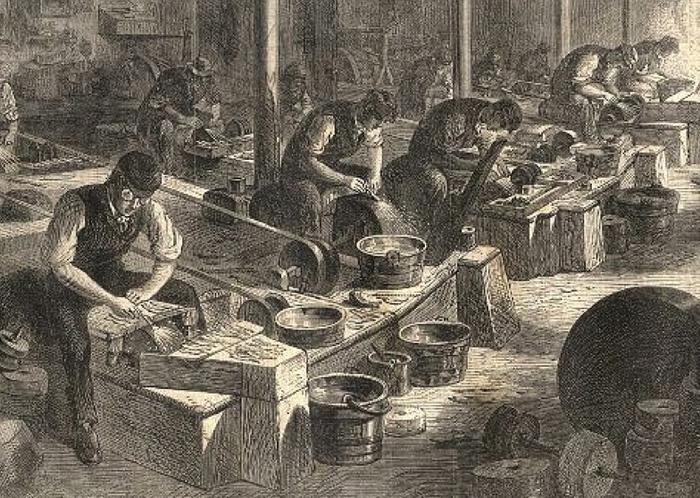
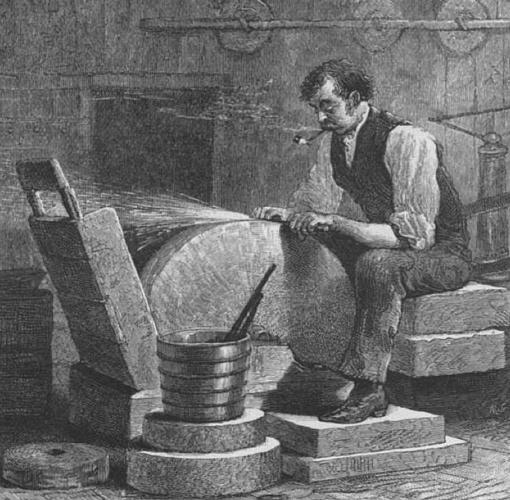
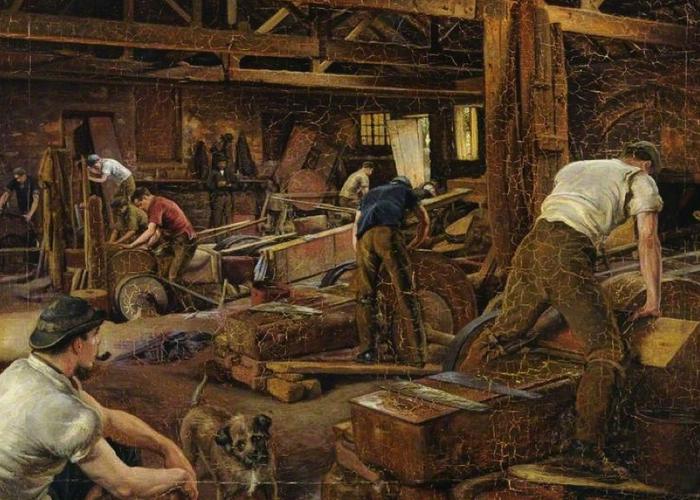
You can clearly see by the sparks which way the wheel is running.
Some pics show how leverage was added - by using a scrap piece of wood to press the steel to the stone. Some even stood over the wheel.
France, Particularly Thiers, seems to have become associated with grinding while laying down, but the practice was carried out in some regions of Sheffield and Solingen, though it did not persist as long as it did in France.
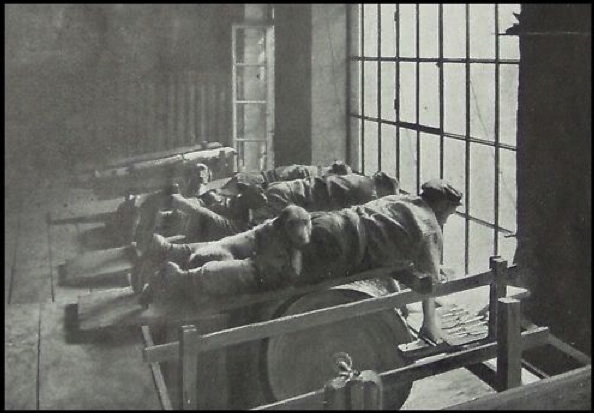
The above is a pic taken in Thiers around 1928, though the practice persisted longer than this. Obviously, the dogs did not add any leverage - the grinder would have to have half his body unsupported for this to come into play. They are there for heat - the bottom of thos boards got cold while splashed with water all day in winter!
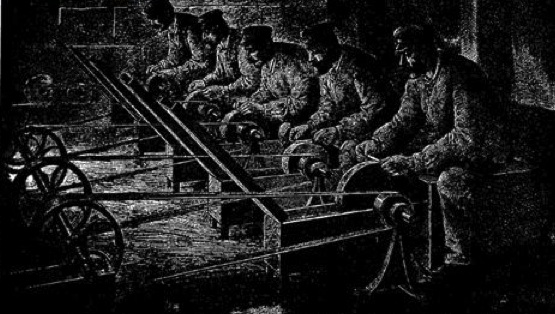
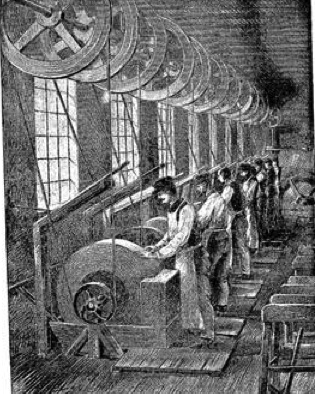
The last two drawings are french, and from an earlier period, and show that not all french grinders lay down while working!
BTW the man with the official title of The Last Razor Grinder in Sheffield was Bill Hukin, who worked at John & William Raggs in Sheffield. He died at the age of 89 in 1999. The man with the official title of Sheffield's Last Jobbing Grinder is Brian Alcock, who is 71 I believe. He holds the title of the last full-time employed grinder, though he is not a razor grinder.
Regards,
NeilLast edited by Neil Miller; 11-15-2014 at 04:11 PM.
-
The Following 4 Users Say Thank You to Neil Miller For This Useful Post:
bluesman7 (11-15-2014), evnpar (11-15-2014), ScottGoodman (11-15-2014), Voidmonster (11-15-2014)
-
11-15-2014, 04:14 PM #6Str8Faced Gent.






- Join Date
- Aug 2013
- Location
- Orangeville, Ontario
- Posts
- 8,463
- Blog Entries
- 1
Thanked: 4207
Great clip. Definitely pre dates whmis and msds's but love to watch the equipment run.
Would be awesome to try your hand at some of those old wheels and belts..
Before the days of guarding and HMIs when things were simpler. Not safer, but definitely simpler.."Depression is just anger,, without the enthusiasm."
Steven Wright
https://mobro.co/michaelbolton65?mc=5
-
11-15-2014, 04:21 PM #7
-
11-15-2014, 04:29 PM #8Senior Member



- Join Date
- Apr 2008
- Location
- Essex, UK
- Posts
- 3,816
Thanked: 3164
Yes Mike, Grace was the woman who featured on a lot of videos about walking and talking a knife, pinning, etc. She seems very capable!
Regards,
Neil
-
11-15-2014, 04:27 PM #9Senior Member



- Join Date
- Apr 2008
- Location
- Essex, UK
- Posts
- 3,816
Thanked: 3164
I don't think you would enjoy it as much as you think, Mike! Those old grinding wheels were rough-hewn sandstone, normally at least 4 feet in diameter. They were taken in at the back of the mill, and the grinder had to drill a hole in the middle and mount then on a stub axle.
Of course, they would not revolve evenly until dressed, so they were run dry and a length of steel was used that pressed into them, first knocking all the high spots off, then gradually forming them into the round. This would take over 30mins, all dry, and the whole mill would be filled with dust. Usually this was undertaken on a sunday so that only the grinders got the best of the dust conditions, and silicosis/grinders lung which invariably followed.
This process was repeated once a week to keep the wheel running true. During the course of dressing it was not unusual to reveal hidden faults and have the wheel fly apart, braining you in the process. but, hey - this could happen at any time - everyone loves surprises, don't they?
The belts powering the wheels hung from the ceiling, and at one time they seemed to loop around everywhere, just inviting you to trip, fall on one, and get well and truly mangled (they motive power was often water, and it takes a while to disengage the shaft from the input drive...
Regards,
Neil
-
The Following User Says Thank You to Neil Miller For This Useful Post:
MikeB52 (11-15-2014)
-
11-15-2014, 04:29 PM #10

Thanks Neil,
In the picture where the grinders are lying down the sparks are showing the wheels turning towards the grinder. Not trying to contradict or make a point, it's just interesting to see all of the different ways this has been done over the years.
I got the impression from the German video that the filming was relatively new in a very old factory. The use of line shafts dates the factory


 33Likes
33Likes LinkBack URL
LinkBack URL About LinkBacks
About LinkBacks






 Reply With Quote
Reply With Quote


